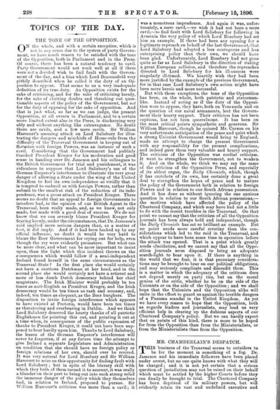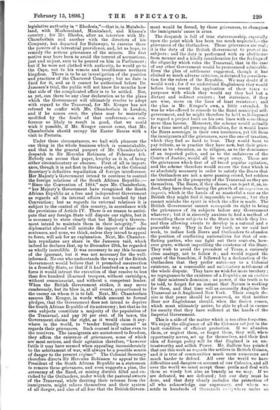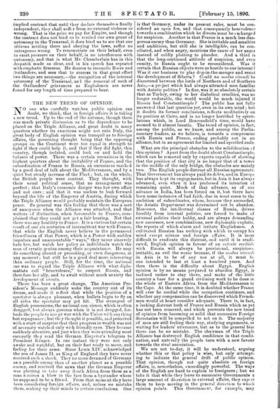MR. CHAMBERLAIN'S DESPATCH. T HIS business of the Transvaal seems to
outsiders to be for the moment in something of a fog. Dr. Jameson and his immediate followers have been placed under arrest, but no one quite knows with what they will be charged ; and it is not yet certain that a serious question of jurisdiction may not be raised on their behalf which must be settled by the higher Courts before they can finally be brought to trial. The Chartered Company has been deprived of its military powers, but will evidently retain its vast and undefined executive and legislative authority in " Rhodesia,"—that is, in Matabele- land, with Mashonaland, Manicaland, and Kbama's country ; for Mr. Rhodes, after an interview with Mr. Chamberlain and another with the directors of his Company, has departed for Buluwayo, to exercise there the powers of a terrestrial providence, and, let us hope, to remedy the serious grievances of the miners. His first motive may have been to avoid the torrent of accusations, just and unjust, sure to be poured on him in Parliament ; but if he were not clothed with authority, he would go to the Cape, not to his remote and troublesome northern kingdom. There is to be an investigation of the position and practices of the Chartered Company ; but no date is fixed for it, and as it cannot be authorised before Dr. Jameson's trial, the public will not know for months how that side of the complicated affair is to be settled. Nor, as yet, can there be any clear declaration as to the plans which the Government will ultimately resolve to adopt with regard to the Transvaal, for Mr. Kruger has not refused to confer with Mr. Chamberlain in London, and if he comes over, the plans may be materially modified by the fruits of that conference,—a con- ference so likely to result in good, that we could wish it possible, if Mr. Kruger cannot come, that Mr. Chamberlain should occupy the Easter Recess with a visit to Pretoria.
Under these circumstances, we hail with pleasure the one thing in the whole business which is unmistakable, and that is the general purport of Mr. Chamberlain's despatch to Sir Hercules Robinson of February 4th. Nobody can accuse that paper, lengthy as it is, of being either circumlocutory or obscure. First of all in import- ance, though it is not first in literary order, is the Colonial Secretary's definitive repudiation of foreign interference. Her Majesty's Government intend to continue to control the foreign relations of the South African Republic:— " Since the Convention of 1884," says Mr. Chamberlain, "her Majesty's Government have recognised the South African Republic as a free and independent Government as regards all its internal affairs not touched by that Convention ; but as regards its external relations it is subject to the control of this country, in accordance with the provisions of Article IV. There is no reason to antici- pate that any foreign State will dispute our rights, but it is necessary to state clearly that her Majesty's Govern- ment intend to maintain them in their integrity." No diplomatist abroad will mistake the import of those calm sentences, and none, we think, unless they intend to appeal to force, will ask for an explanation. Next, Mr. Chamber- lain repudiates any share in the Jameson raid, which indeed he declares that, up to December 29th, he regarded as wholly incredible. It was necessary to say this because of the ignorant, but it was not necessary for the well- informed. No one who understands the ways of the British Government would believe that it promoted insurrection in a friendly State, or that if it had resolved on a resort to force it would intrust the execution of that resolve to less than five hundred ill-armed troopers, without cartridges, without commissariat, and without a competent leader. When the British Government strikes, it may move cumbrously, but its blow is, at all events, proportioned to the enemy on whom it is to fall. Next, Mr. Chamberlain assures Mr. Kruger, in words which amount to formal pledges, that the Government does not intend to deprive the South African Republic of its autonomy ; but that as its own subjects constitute a, majority of the population of the Transvaal, and pay 90 per cent. of its taxes, the Government claims the right, as it would claim it any- where in the world, to " tender friendly counsel " as regards their grievances. Such counsel is of value even to the receivers. The immigrants are accustomed to freedom, they affirm the existence of grievances, some of which are most serious, and their agitation therefore, " however futile it may have seemed when appealing inconsiderately to the arbitrament of war, will always be a possible source of danger to the present regime." The Colonial Secretary therefore directs Sir Hercules Robinson to appeal to the President of the South African Republic as a statesman to remove these grievances, and even suggests a plan, the autonomy of the Rand, or mining district filled and en- riched by the Outlanders, under which the pastoral owners of the Transvaal, while deriving their revenue from the immigrants, might relieve themselves and their system of all danger, and also of all fear that the British Govern- ment would be forced, by those grievances, to champion the immigrants' cause in arms.
The despatch is full of true statesmanship, especially upon the point which has been too much neglected,—the grievances of the Outlanders. Those grievances are real ; it is the duty of the British Government to protect its subjects ; and the duty is performed with an abstinence, from menace and a kindly consideration for the feelings of the oligarchy which rules the Transvaal, that in the case of any other Government would be pronounced admirable. Even the plan of settlement suggested, though it has elicited so much adverse criticism, is dictated considera- tion for the rulers of the Republic. We may doubt if it would work ; for if we understand Englishmen they would before long resent the application of their taxes to purposes with which they would say they had but a distant and indirect concern ; but statesmen, if they are wise, move on the lines of least resistance; and the plan is Mr. Kruger's own, a little extended. It was he who offered to concede to the Rand municipal self- government, and he might therefore be held well-disposed to regard a project built on his own lines with something more than favour. Moreover, the scheme would actually for a time meet all pressing difficulties, for it would leave the Boers sovereign in their own territories, yet lift from the immigrants all the grievances, save the one of taxation, which they find so hard to bear. They would have to pay tribute, as in practice they have now, but their griev- ances as to education, as to religion, as to the dominance of an imported police, and as to the unfairness of the Courts of Justice, would all be swept away. Those are the grievances which first of all breed popular agitation, and the scheme therefore would secure the time which is so absolutely necessary in order to satisfy the Boers that the Outlanders are not a mere passing crowd, but settlers as interested in the prosperity of the Transvaal as they are themselves. The Boers, if they choose, can reject it, as, in- deed, they have done, fearing the growth of an ihept rium in imperio, which in the hands of so masterful a race as the British they might find it impossible to govern ; Lut they cannot mistake the spirit in which the offer is made. The British Government cannot relinquish its right to bring the grievances of its subjects before any Government whatever ; but it is sincerely anxious to find a method of reconciling those subjects to the State in which they live, and thus allowing events to develop in a natural and a peaceable way. They in fact try hard, as we said last week, to induce both Boers and Outlanders to abandon, the position of conflicting nationalities for that of con- flicting parties, who can fight out their contests, how- ever grave, without imperilling the existence of the State. They wish to avoid the precedent of Texas, a curiously close analogy, not to follow it ; and would regard the grant of the franchise, if followed by a declaration of the Outlanders that they prefer autonomy to a Colonial• existence, as a reasonable and satisfactory settlement of the whole dispute. They have no wish for more territory ; no repugnance to the existence of a Republic as an enclave- of their mistress's dominion ; no power, if the truth is to be told, to forget for an instant that Nature is working for them, and that time will as assuredly Anglicise the Transvaal as it Anglicised New York. Their simple de- sire is that peace should be preserved, so that neither Boer nor Englishman should, when the fusion comes,. which must ultimately arrive, be able to plead in excuse- for emnity that they have suffered at the hands of the Imperial Government.
This is a side of the matter which is too often forgotten. We enjoy the allegiance of all the Colonies sul,ject to the tacit condition of efficient protection. If we abandon them, or neglect them, or forget them, they will, when opportunity serves, set up for themselves, and their first i idea of foreign policy will be that England is an un- trustworthy and selfish Power. Mr. Balfour has pointed that out this week as regards the settlers in British Guiana, and it is true of communities much more numerous and much harder to defend. All over the world we have difficulties and dangers on account of our Colonies, and all over the world we must accept those perils and deal with them as wisely but also as bravely as we may. If we are defeated, we are defeated ; but our duty must be done, and that duty clearly includes the protection of all who acknowledge our supremacy, and whom we settle in hundreds of thousands everywhere under an implied contract that until they declare themselves finally -independent, they shall suffer from no external violence or wrong. That is the price we pay for Empire, and though the contract does not bind us to rescind our own grant of autonomy to the Transvaal, it does bind us to see that our citizens settling there and obeying the laws, suffer no outrageous wrong. To remonstrate on their behalf, even to exert pressure on their behalf, is no interference with autonomy, and that is what Mr. Chamberlain has in this despatch made so clear, and in his speech has repeated with emphatic firmness. He desires to reconcile Boers and Outlanders, and sees that to success in that great effort two things are necessary,—the recognition of the internal autonomy of the Transvaal, and the removal of such of the Outlanders' grievances as Englishmen are never found for any length of time prepared to bear.




































 Previous page
Previous page